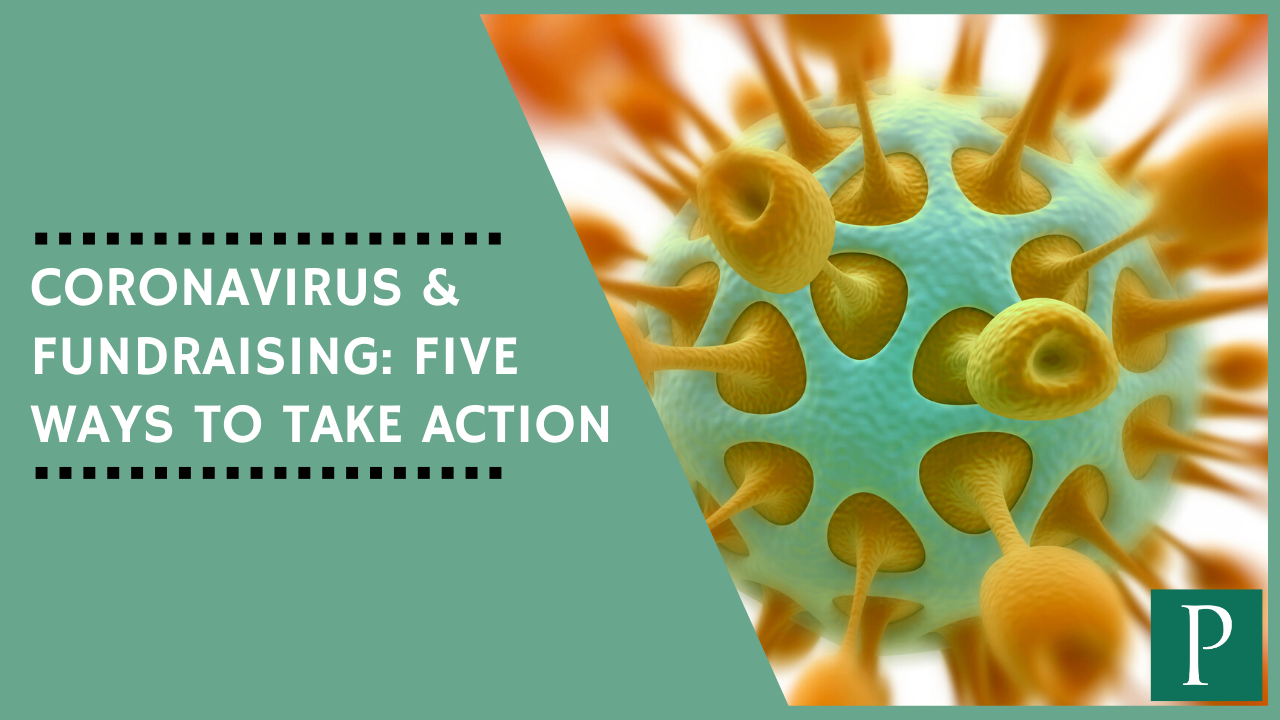Coronavirus and Fundraising: Five Ways to Take Action

By Andrew N. Robison, President of Petrus Development
This week has been pretty intense. The Coronavirus, or COVID-19, is wreaking havoc everywhere. We have seen college campuses cancel all classes and meetings for the remainder of the spring semester. We have seen states ban all gatherings of more than 250 people. We have seen major sports events and even leagues suspend all play even in the midst of season-ending playoffs and tournaments. And now we have seen dioceses suspend all public Masses for the rest of the month.
So how will all of this affect philanthropy?
Well, it remains to be seen what that impact will be, but we have no doubt it will be felt. Just in the state of Texas, two popular events have been canceled due to Coronovirus concerns. In 2019, SXSW in Austin and the Houston Livestock Show and Rodeo generated an estimated $583 million for the local and state economy. Canceling those events in 2020 will undoubtedly have an impact on regional giving to both Catholic and non-Catholic charities.
Businesses will suffer losses and workers will lose their jobs. Employees may be looking at furloughs and hourly earners will most definitely take a hit to their income. The bottom line is that when people have less money, they will give less to charity.
I just heard from a colleague who had a donor go from a $500,000 verbal commitment on Monday to a “let’s see how this plays out over the next few months” note from that same donor on Thursday. No question that the COVID-19 pandemic is going to be a problem for fundraising.
So you’re probably thinking, “Wow! This sounds incredibly dire and depressing so far.” For that, I am sorry. While the facts are pretty severe when laid out in this way, that doesn’t mean that it’s all bad news and there’s nothing that we can do about it. Most people who get into nonprofit work, and specifically development work, are optimistic and eager to dive in and make a difference. For that reason, we decided to put together a list of action items that you can take during this period of uncertainty.
1. Communicate with your donors. Communication builds trust and your donors will appreciate hearing from you and hearing that you have a plan.
How is COVID-19 changing your ministry? How are you adjusting your outreach to ensure that you can still impact lives in the short- and long-term? Are planned events being affected? If you have to adjust events, can they be postponed instead of canceled?
People want to hear a hopeful message and approaching the current crisis as a temporary suspension that you are actively working through gives our donors confidence and something to look forward to.
Obviously, only time will tell how serious this pandemic is both globally and locally, but at some point it will be over and life will return to stability. Maintaining consistent communication will build trust now that will ultimately translate to more loyal donors down the road.
2. Make automatic giving programs a priority. An automatic monthly giving program is one of the most effective ways that you can build sustainability into your development efforts.
According to a 2019 study from Pushpay, recurring donors who donate through an automatic system give 42 percent more on average than those who make one-time gifts by cash or check. This is not surprising when you consider the benefits that monthly giving offers to both donors and charities.
Giving is consistent and happens whether people make it to church or into your ministry doors each week. And with the news that at least two Catholic dioceses and a number of other faith communities have now suspended Masses for the remainder of the month, we know with absolute certainty that Mass attendance will drop and as a result, giving will drop as well.
Offering automatic giving options to our donors allows them to continue to support your ministry even when they cannot be present. In addition to recurring giving programs, text giving can also play an important role in giving during a pandemic.
3. Continue to invest in donor meetings. This is not a time to disconnect from our donors. In fact, this is the time when you need to be connecting with as many people as possible...and technology can help with that.
Even if circumstances make it difficult or unwise to present proposals, this time should be spent cultivating and stewarding our existing donors. As we mentioned in Action Item #4, downtimes don’t last forever and those who spend time preparing are the ones who are successful when the times are over.
Scheduling in-person meetings in times of pandemic may not be the most prudent thing to do, but that doesn't mean we can't reach out and connect. Consider setting up video calls using Facetime, Skype, Zoom or some other video conferencing tool. Some donors may not be comfortable with the technology, but will appreciate the effort. The point is that we need to continue reaching out.
It’s also important that we don’t answer on behalf of our donors. When I work with new development officers and priests, this is a big challenge to overcome. It is natural for most of us (especially those with pastoral training) to want to protect those around us that we care for. Sometimes this means that we think we know how donors would react to being asked for a gift and we answer NO on their behalf without ever actually extending the invitation. While we have to be prudent in when we ask for gifts and meetings, we can’t avoid making the ask assuming we already know the answer.
4. Learn and plan. Having a reduction in meetings, events and travel should allow some additional free time in your schedules. Make use of that time by educating yourself on development practices and making plans for the future.
It’s like the story of two athletes during the offseason. One spends his time-off recovering from an exhausting season, relaxing and taking it easy while the other doubles down on his training, spends extra time in the weight room and pours over hours and hours of videos in the film room. When the season eventually starts (which it always does), one athlete is ready to dominate while the other has to play catchup and may or may not end up making the team.
Petrus has over 30 podcast episodes featuring insightful and inspirational interviews on the topic of religious fundraising. In addition, Petrus has two recorded webinars and new webinars coming up monthly through the end of the year. You can also check out our list of six books that every fundraiser should read. All of these can be done whenever you have a few free minutes and will lead to you being more inspired, educated and informed.
If you are looking for strategies that can help you create a short- and long-term plan for your development efforts, check out the Petrus Annual Manual. This program gives organizations a development calendar, library of resources and samples, a weekly email and a weekly phone call with a Petrus consultant. This could be the perfect time to set this in motion and reap the benefits long into the future.
In addition to resources on the Petrus website, there are so many resources available through the Association of Fundraising Professionals as well as dozens of other fundraising websites and authors. Spend this time learning and planning and you’ll be far better positioned when “normal” comes back to town.
5. Pray. Prayer is what will bring us all through this pandemic.
Pray for those families affected by COVID-19. Pray for civic and religious leaders charged with leading during tough times. Pray for our donors and pray for our ministries. Nothing is more important during times of uncertainty, panic and chaos than to draw strength from the Lord.
Can you form a virtual prayer network with colleagues and friends? Could your ministry reach out to constituents and donors and invite them to join you for a daily Angelus or Chaplet?
If we are not spending time in prayer regularly, it is tough to fully realize that strength. I encourage you to spend an extra hour in adoration or pray an extra rosary this week. God alone can provide physical, emotional and spiritual healing, and we must rely on Him and ask for His help daily.
I don’t know about you, but I know that I always feel better and less anxious when I have things to do, and I am able to feel like I am making a difference. Hopefully this list gives you some tangible action items that can allow you to be part of the solution.
We are told in Matthew 25 that we cannot know the day or the hour when the Lord will come, so we must keep watch and act with all vigilance. I pray that you will be filled with peace and commitment to persevere. God helps those who help themselves, so take this opportunity to seize the day and take action!
God bless.
READY TO BECOME A BETTER FUNDRAISER?
Sign up below to receive tools, ideas, and inspiration to take your development efforts to the next level.
We hate SPAM. We will never sell your information, for any reason.


